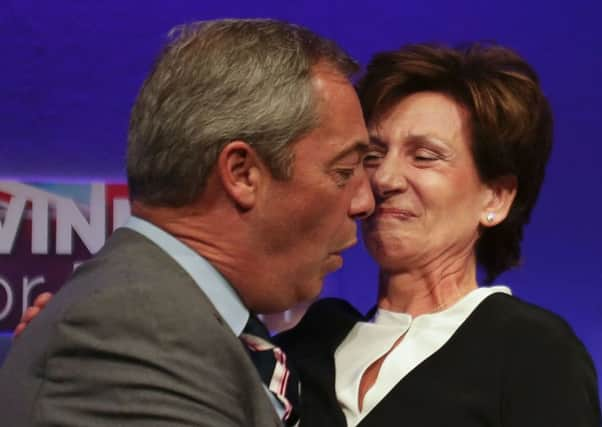Euan McColm: Ukip doesn't need Farage to form opposition


Prime Minister Theresa May was watching the next official opposition at Westminster, said James. The new leader was neither Nigel-light nor Nigel-like, she insisted, before telling Union Flag-waving delegates that professionalism would be top of her agenda.
One wonders why she would bother. Ukip has risen from the fringes of UK politics to becoming an influential force without ever displaying the slightest interest in behaving at all professionally. In fact, the party’s amateurism has been an advantage. Ukip’s story that it’s not like all those other parties with their “career politicians” is hugely appealing to a section of the electorate.
Advertisement
Hide AdAdvertisement
Hide AdA more pressing objective than professionalising Ukip will be for James to step out from the shadow cast by Farage. This will not be done easily. When Ukip is dismissed as a one man band, it is with good reason.
Love or loathe Farage, one cannot underestimate the impact he has had on British politics.
Where some of us see a tiresome pub bore, a bully, a spiv, others see a folk hero. Farage, a former city trader who has lived a life of privilege, is – to a very great number of Britons – a man of the people.
More than any other politician, Farage deserves – depending on your position on EU membership – either the credit or the blame for the UK voting for Brexit. It was, after all, Farage’s achievement in building Ukip into a sizeable fighting force that spooked former prime minister David Cameron into calling the EU referendum.
It may be tempting for those among us who disdain Farage’s politics to believe that the end of his leadership will mean the beginning of the end for Ukip. Having achieved its objective of winning majority support for the objective of breaking from the EU, the party surely doesn’t have anything else to achieve.
But James’s bold claim that Ukip is the official opposition in waiting revealed that she sees Labour as vulnerable to her party’s approaches.
During the referendum campaign, Ukip’s blunt, often unsavoury campaign messages around immigration were hugely popular in areas which were considered to be Labour heartlands. In swathes of northern England, Labour has, for years, watched voters trickle away towards Ukip. The referendum has shown those voters, who feel abandoned by larger parties, that the kippers can deliver on their promises.
James, an MEP, is a largely unknown figure in UK politics, but that will change, and who is to say that she can’t continue to attract voters away from Labour?
Advertisement
Hide AdAdvertisement
Hide AdSupporters of Labour leader Jeremy Corbyn may believe that their man provides an authentic voice for the working classes, but the reality is that Corbynistas are afflicted by unhelpful romantic notions of class unity and shared struggle.
What Farage and his Ukip colleagues understand is that many voters in deprived areas want politicians who can articulate their dissatisfaction with a system they feel has let them down. Along with this understanding, the kippers have no compunction about saying things about immigration which Labour politicians would never dare to.
The Scottish independence referendum had a devastating impact on Labour. Those who had stuck with the party before 18 September, 2014, came out of the other side of the campaign with their views changed.
Many Labour voters had backed a Yes vote and so, understandably, they shifted their allegiance to the SNP.
It is surely not difficult to imagine that a proportion of former Labour voters in England who backed Brexit will now see Ukip as the party that best reflects their priorities.
James has a clear and simple story to keep those voters on board. The people may have voted to leave the EU; now the task is to ensure this is done cleanly and without compromise.
Just as former first minister Alex Salmond spoke of holding the UK government’s “feet to the fire” over promises of greater devolution, so James’s Ukip promises to do exactly the same over Brexit.
And, as Ukip demands hard Brexit (rather than the namby-pamby soft variety) and the return to blue passports, Labour will continue to disintegrate.
Advertisement
Hide AdAdvertisement
Hide AdWhen Corbyn is confirmed next weekend as winner of the party’s current leadership contest, Labour will enter a brutal period of score-settling that will see hard-left activists set against sitting MPs whose moderate views will mark them out as targets for deselection.
As this battle unfolds, Ukip – if it sticks to its simple (or, more accurately, simplistic) messages about ensuring that the will of the people is met – should be able to consolidate the support it picked up during the EU campaign.
Those closest to Corbyn have a fantastic vision of a mass movement of workers rising up against the corrupt capitalist elite and taking back power, but this is the stuff of middle-class daydreams. Ukip, on the other hand, has shown that it can punch the establishment on the schnozzola and that, in the current political climate, holds some appeal for the disenchanted voter.
Of course, Ukip has a track record of infighting that might yet derail the party. Farage’s leadership was not without its moments of difficulty as colleagues briefed against him and even conspired to get rid of him. But if James can bring together this ragbag of a party then she may take it on to more success.
Labour has abandoned any serious attempt to win back voters it has lost in recent years as it concerns itself with building a time tunnel back to 1974.
Meanwhile, Diane James knows exactly what many of those voters want to hear.